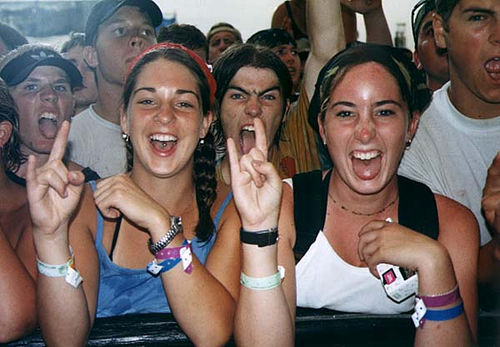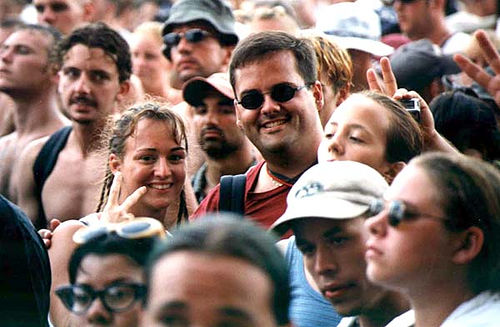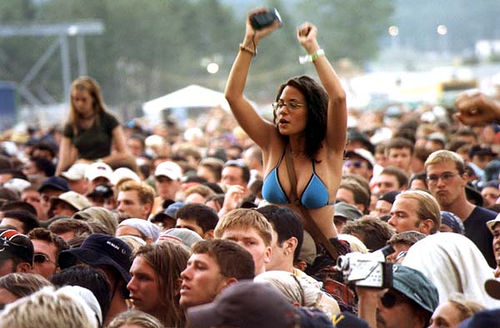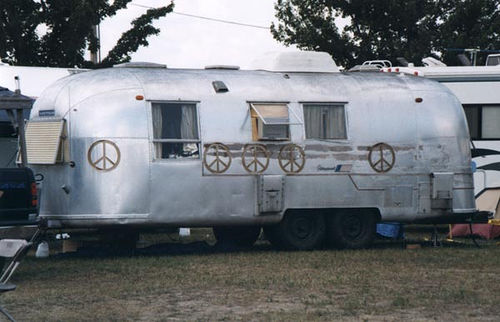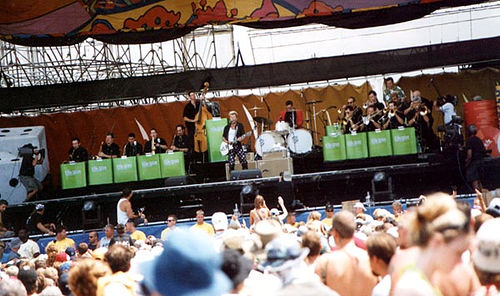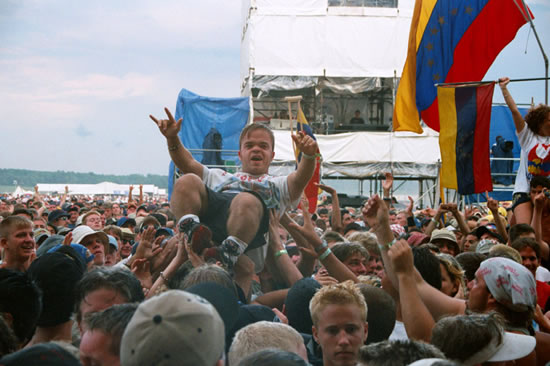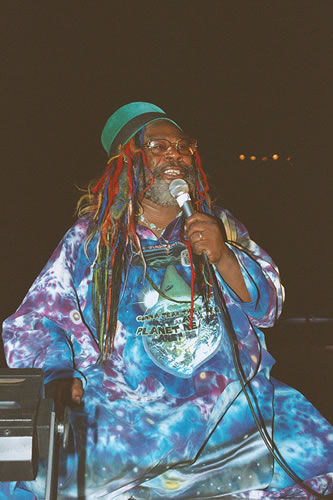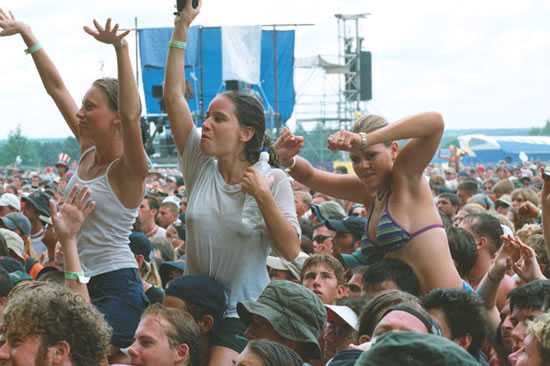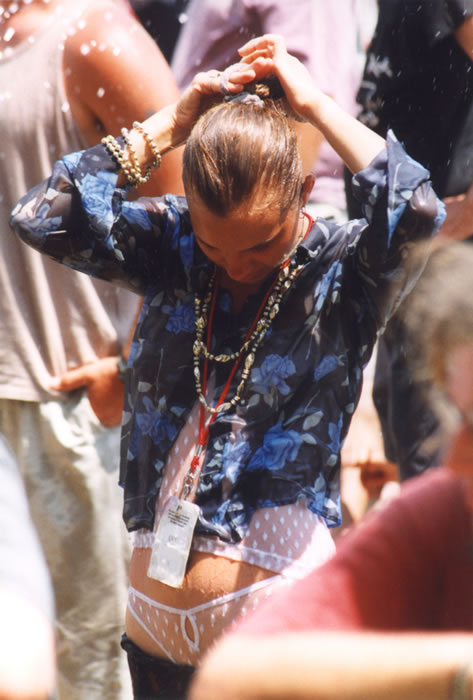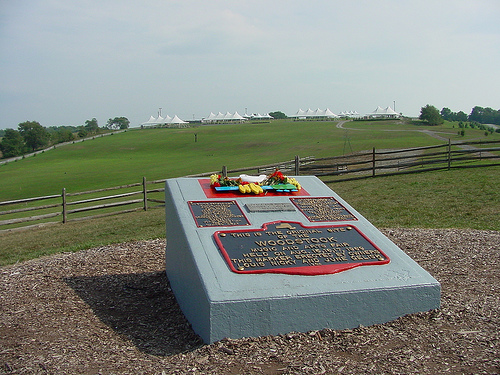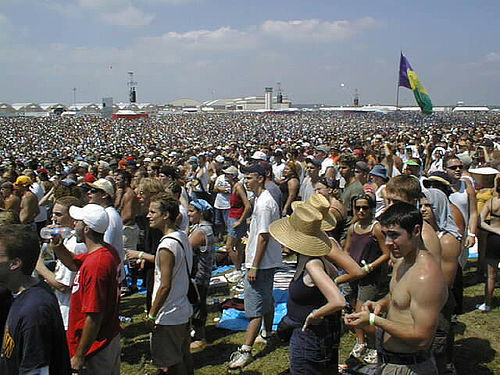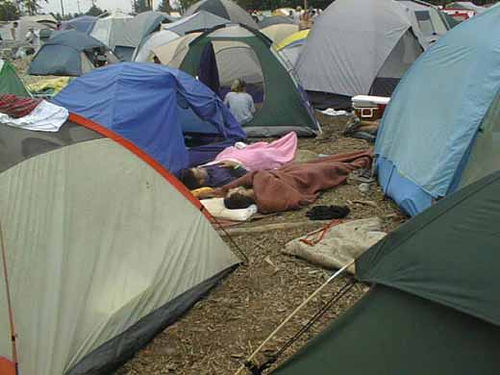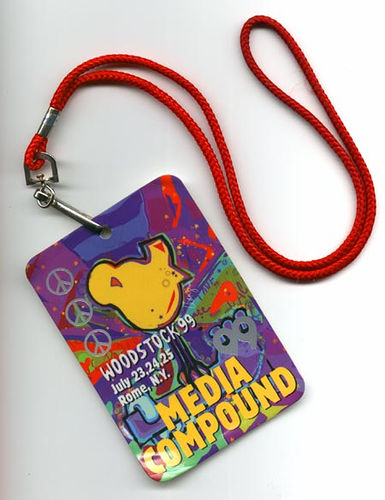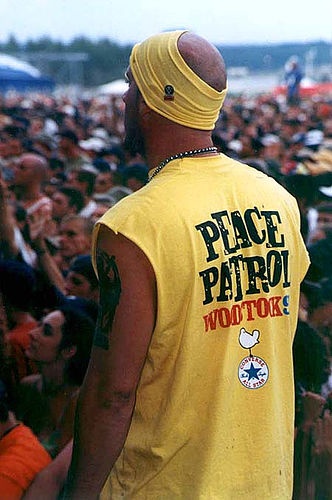

WOODSTOCK 1999
Woodstock 1999, held July 23-25, 1999 was the second large-scale music festival (after Woodstock '94) that attempted to emulate the success of the original Woodstock Festival of 1969. Like the previous concerts with the same name, it was held in upstate New York, this time in Rome, New York. Approximately 200,000 people attended the festival. Cable network MTV covered the concert extensively and live coverage of the entire weekend was available on pay-per-view. Excerpts from the performances were later released on compact disc and DVD.
Woodstock '99 is best remembered for reports of violence, rape, fires, and an abrupt closing down of the show.
The concert was held at the former Griffiss Air Force Base, a Superfund site.
Prior to the concert, the promoters of the event were determined to avoid the gate-crashing that had occurred at previous festivals, and had characterized the site as "defensible", describing the 12-foot plywood and steel fence intended to keep out those without tickets. About 500 New York State Police Troopers were hired for security.
In addition to two main stages, secondary venues were available including several alternate stages, a night-time rave music tent and a film festival (sponsored by the Independent Film Channel) held in a former airplane hangar.
In contrast to the more grass-roots nature of the original Woodstock festival, Woodstock 1999 was conceived and executed as a commercial venture with dozens of corporate sponsors, and included the presence of vendor "malls" and modern acoutrements such as ATMs and e-mail stations.
Critics later decried the use of the Woodstock brand name for such an event as "crass commercialization" and decried "concert organizers who gouged the kids with grossly overpriced water, beer, and food". Tickets for the event were priced at $150 plus service charges, at the time considered high for a festival of this type.
Tom Morello, the politically-active guitarist for festival performers Rage Against the Machine later "suggested an affinity between the looters and rapists at the event and the corporate entities that sponsored it."
The festival featured a diverse lineup of acts and early reviews for many of the acts were positive; critics particularly praised performances by George Clinton, Jamiroquai, James Brown, Sheryl Crow, and Rage Against the Machine. However, critical and public attention quickly turned to the deteriorating environment and crowd behavior.
Problems of Woodstock 1999
Oppressive heat and difficult environmental conditions marred the festival from early on.
Participants who had not brought sufficient food or water to the show were left to buy from onsite vendors, whose merchandise was expensive (a single-serving pizza sold for $12, and 20-ounce bottles of water and soda for $4).
Poor sanitation and security, the lack of available water, and 100-degree heat with no available shade quickly led to a dangerous environment.
The number of toilets installed proved insufficient for the number of attendees. Within a short time, the few facilities were unusable and overflowing onto the concert grounds. People stood in line to access the water fountains, until frustration impelled a few to break the pipes apart to provide water to those in the middle of the line; this in turn led to the creation of large mud pits and attendant mud-fights that added to the general chaos.
Some crowd violence and looting was reported during the Saturday night performance by Limp Bizkit, including a rendition of the song "Break Stuff". Reviewers of the concert criticized Limp Bizkit frontman Fred Durst as "irresponsible" for encouraging the crowd to destructive behavior.
Violence escalated the following night in the final hours of the concert as Red Hot Chili Peppers performed. A group of peace promoters led by an independent group called Pax had distributed candles to those stopping at their booth during the day, intending them for a candlelight vigil to be held during the Red Hot Chili Peppers' performance of the song "Under the Bridge". During the band's set, the crowd began to light the candles, some also using them to start bonfires. The hundreds of empty plastic water bottles that littered the lawn/dance area were found to be excellent fuel for the fires.
After the Red Hot Chili Peppers were finished with their main set, the audience was informed about "a bit of a problem." An audio tower caught fire, and the fire department was called in to extinguish it.
Back onstage for an encore, the Chili Peppers' lead singer Anthony Kiedis remarked how amazing the fires looked from the stage, comparing them to a scene in the film Apocalypse Now. The band proceeded to play "Sir Psycho Sexy", followed by their rendition of Jimi Hendrix's "Fire". Kiedis later stated in his autobiography that Jimi Hendrix's sister asked the Chili Peppers to play "Fire" in honor of Jimi, and that they were not playing it to encourage the crowd.
Many large bonfires were burning high before the band left the stage for the last time. Participants danced in circles around the fires. Looking for more fuel, some tore off panels of plywood from the supposedly inviolable security perimeter fence. ATMs were tipped over and broken into, trailers full of merchandise and equipment were forced open and burglarized, and abandoned vendor booths were turned over, and set on fire.
MTV, which had been providing live coverage, removed its entire crew. MTV host Kurt Loder described the scene in the July 27, 1999 issue of USA Today:
"It was dangerous to be around. The whole scene was scary. There were just waves of hatred bouncing around the place, (...) It was clear we had to get out of there.... It was like a concentration camp. To get in, you get frisked to make sure you're not bringing in any water or food that would prevent you from buying from their outrageously priced booths. You wallow around in garbage and human waste. There was a palpable mood of anger."
After some time, a large force of New York State Troopers, local police, and various other law enforcement showed up. Most had crowd control gear and proceeded to form a riot-line that flushed the crowd to the northwest, away from the stage located at the eastern end of the airfield. Few in the crowd offered strong resistance and they quickly dispersed back toward the campground and out the main entrance.
Police later reported that at least four rapes had occurred during the concert.[18] Seven arrests were made on the final night of the concert and, afterward, police reviewed video footage, hoping to identify and hold accountable looters who, amid the chaos, had not been arrested. Some one-dozen trailers, a small bus and a number of booths and portable toilets were burned in the fray. Six people were injured.
Performer List
No groups that performed at the original Woodstock festival took the stage at Woodstock 1999, although John Entwistle of The Who performed a solo set, and Micky Hart, drummer of the Grateful Dead, played with his band Planet Drum.
* 2 Skinnee J's
* 3rd Bass
* Alanis Morissette
* Britney Spears
* Bruce Hornsby
* Buckcherry
* Bush
* The Chemical Brothers
* Collective Soul
* Counting Crows
* Creed featuring Robby Krieger
* Dave Matthews Band
* Djoliba
* DMX
* Elvis Costello
* Everclear
* Everlast
* Fatboy Slim
* Full Devil Jacket
* G. Love and Special Sauce
* George Clinton & the P.Funk All-Stars
* Gigolo Aunts
* Godsmack
* Guster
* Ice Cube
* Insane Clown Posse
* James Brown
* Jamiroquai
* Jewel
* John Entwistle
* Kid Rock
* Korn
* Limp Bizkit
* Lit
* Live
* Los Lobos
* Megadeth
* Metallica
* Mickey Hart/Planet Drum
* Mike Ness
* Moby
* moe.
* Muse
* The Offspring
* Oleander
* Our Lady Peace
* Particle
* Pull
* Rage Against the Machine
Rage Against the Machine burning the American flag onstage while playing "Killing in the Name" during Woodstock 1999.
* Red Hot Chili Peppers
* Reveille
* The Roots featuring Erykah Badu
* Rusted Root
* Serial Joe
* Sevendust
* Sheryl Crow
* Spitfire
* String Cheese Incident
* The Tragically Hip
* The Umbilical Brothers
* Vertical Horizon
* Willie Nelson
* Wyclef Jean with the Refugee Allstars
Recordings
Music from Woodstock 1999 was released on a two-disc compact disc set, Woodstock 1999. The album features 32 performing artists, and was released on Epic Records in October 1999.
A DVD of concert highlights, also entitled Woodstock 1999 was released in March 2000. It features one song each from 28 of the participating acts.


